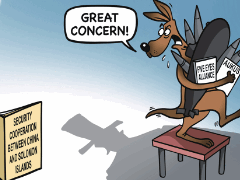Russia has reportedly notified the US about its plans to carry out the annual "Grom" exercises of its nuclear forces, which indicates that effective communication still exists between the two nuclear-armed powers, despite serious tension over the Ukraine crisis, said Chinese analysts on Wednesday.
However, concern over an escalation of the conflict is still rising, with European countries asking for more mediation and even questioning the US strategy to isolate Russia, while others believe that as battles rage in Ukrainian regions like Kherson, the conflict is bound to escalate.
At the same time, the US-led NATO annual nuclear deterrence exercise code-named "Steadfast Noon" is being conducted in airspace over northwest Europe from October 17 to 30, involving 60 military aircraft from 14 NATO countries. A NATO spokesperson said in a statement that "this exercise helps ensure that the Alliance's nuclear deterrent remains safe, secure and effective," Reuters reported.
Washington confirmed on Tuesday that Russia notified the US about its latest plans for the annual exercises of its nuclear forces, and the US said the Russian move "lowers the risk" of miscalculation.
In the past, Russia had fired intercontinental ballistic missiles during its "Grom" exercises. Under the New START Treaty, Russia is obliged to provide advance notification of such missile launches, said US officials.
"The US was notified, and, as we've highlighted before, this is a routine annual exercise by Russia," spokesperson Air Force Brigadier General Patrick Ryder announced at a news briefing. Ryder declined to offer further details, Reuters reported on Tuesday.
"There has always been this tacit agreement between the US and Russia over the avoidance of nuclear war. When Russia and Ukraine attacked each other's civil facilities a few days ago, there was an immediate Washington-Moscow hotline conversation that is intended to avoid strategic miscalculation between the two sides," Cui Heng, an assistant research fellow from the Center for Russian Studies of East China Normal University, told the Global Times on Wednesday.
For both the US and Russia, they are far from "flipping the table," as Ukraine is not in the direct interest of the US, and Russia still has cards to play on the battlefields in Ukraine, Cui noted.
The US, Russia and major EU members all deal with one another "from a position of strength," and they will start to listen to one another carefully only after they have "flexed their muscles," Shen Yi, a professor at the School of International Relations and Public Affairs of Fudan University, told the Global Times on Wednesday.
Russian Defense Minister Sergei Shoigu and US Defense Secretary Lloyd Austin spoke by phone for the first time since May on Friday and a top Russian diplomat said the call was needed to eliminate misunderstandings over the Ukraine crisis, TASS news agency reported.
Song Zhongping, a Chinese military expert and TV commentator, told the Global Times on Wednesday that "the Russian exercises intend to send a message to the US - you should stay away and not get involved directly. The NATO nuclear drills are not sending a message to Russia, but to NATO members - we have a nuclear deterrence too, but only NATO members will be protected, so don't be too worried about what happens in Ukraine."
In other words, although Kiev desperately wants the US or NATO to exact revenge for the damage caused by Russian missile strikes over Ukraine, NATO is telling Kiev "this is impossible," Song noted.
While Ukraine wants the conflict to be escalated so that the US and other NATO members would be forced to get involved directly, many European countries, also NATO members, are showing a more reluctant stance to maintain hostility and isolation against Moscow, experts said.
There has been shifting of tones in Europe toward Russia that is completely different from the first half of the year. While Eastern European countries such as Lithuania areclosely following the US' footsteps, Western European countries including France and Germany - major powers of the EU - have realized they must shoulder the responsibility for the future peace and security on the continent with more pragmatic and realistic mind-sets, Cui noted.
"This is a good sign of de-escalation, as Europe is starting to realize that a proper mediator is crucial in preventing the conflicts from being ignited further," the expert said.
French President Emmanuel Macron asked Pope Francis to call Russian President Vladimir Putin to help resolve the Ukrainian crisis, Le Point, a French weekly political and news magazine, reported on Tuesday.
Norwegian Prime Minister Jonas Gahr Store said on Tuesday that Western countries should not isolate Russia, on the contrary, they should establish direct communication with Moscow to resolve the exceptionally difficult current political situation, Sputnik reported.
"Nothing good will come from isolating Russia. It is alarming that today we have so few contacts and direct communication with Russia," Store told the Norwegian parliament, as quoted by the NRK broadcaster.
In fact, countries like Germany, France, and Italy are slowing down the sale of weapons and aid to Ukraine. The objective reason is that Europe's own production capacity is limited, and the other reason is that major arms producers in these countries have been changing their attitude toward Russia, Cui said.




